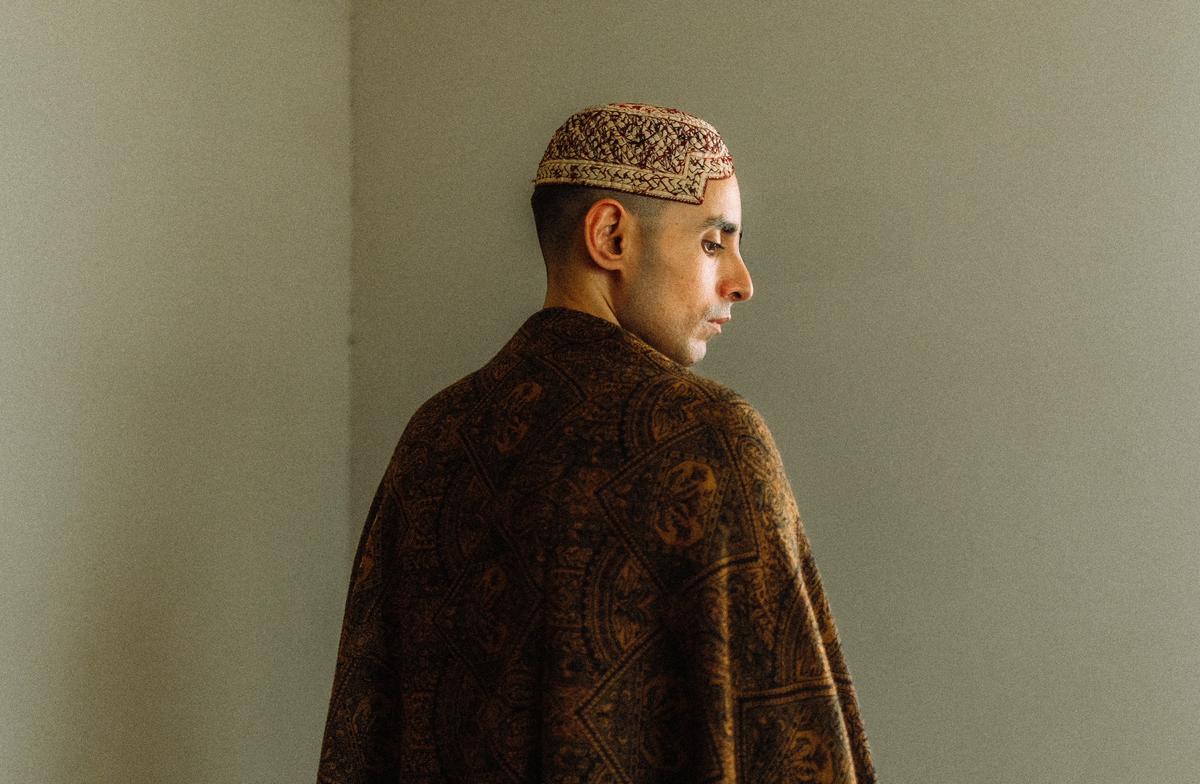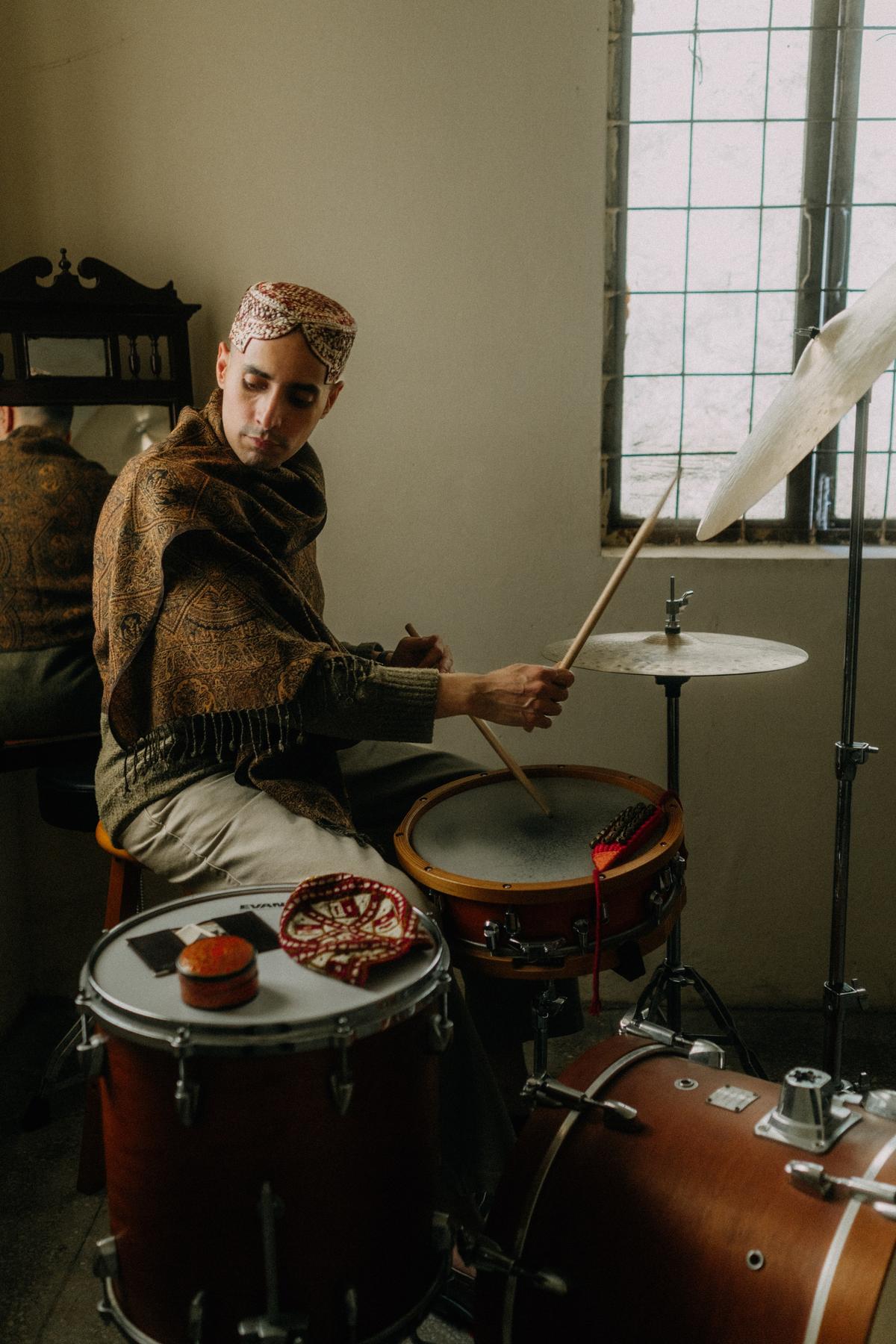Two photographs, a Yashica 635 camera, and the weight of grief orchestrate a symphony of jazz in the creative world of Tarun Balani, who is all set to release his fourth album Kadahin Milandaasin in May.
Intended to be an empathetic epistle to the pain and longing of migrants, the seven-track album has been recorded, mixed, and mastered by Grammy-winning sound engineer and producer John Davis at Bunker Studio in Brooklyn, New York, and has been mounted on German record label Berthold Records.
Jazz musician and drummer Tarun Balani
| Photo Credit:
Special arrangement
It is inspired by Delhi-based musician Tarun’s memories of his grandfather — Khialdas Suratram Balani, an illustrator, artist and photographer, who migrated from Naushahro Feroze, in Sindh, Pakistan to Delhi’s refugee colony Lajpat Nagar during the Partition. “While Kadahin Milandaasin explores my quest for familial roots, it is a deeply personal account of the loss I feel, first from the demise of my grandfather, who I never had the chance to meet; and second, from that of my father, who passed away in November last year, soon after I completed recording the album,” shares Tarun.
He traces the album’s inception to February last year, when his father handed him two photographs of his grandfather. “I grew up around my grandfather’s art. As a kid, I remember opening the cupboard in which his Yashica 635 camera rested, and would play with it all day. Though there was palpable grief about my grandfather’s death in my family, no one really talked about it. So, I only could know my grandpa through his works and material memory,” says Tarun, adding, “My grandfather was a short story writer too. One of his short stories, Prabha ain Kranti was featured in Sindhi Sahitya Academy compilations. I would often concoct imaginative stories about his life. Now, as a mid-career artiste myself, I would love to have chatted with him about his life and maybe know what it was like to be painting and photographing in the 1960s.”
Name’s sake
The two photographs that Tarun received from his father now serve as the album’s cover art. “The cover was designed by Travassos, an artist from Lisbon. A Sindhi scholar and poet, Vimmi Sadarangani, helped me get the Sindhi script, a mix of Persian and Arabic, for the cover,” says Tarun.

Many of Tarun’s influences, ranging from jazz stalwarts Ryuichi Sakamoto and Nina Simone to electronic musicians like Brian Eno and Indian classical music too, bleed into his music.
| Photo Credit:
Special arrangement
The title of the album finds its muse in Sindhi poet Shaikh Ayaz’s poem called Teri Pawanda. “He wrote this poem for his friends and family and it expressed a feeling of loss and grief, along with a reassurance of reunion; thus, the verse, ‘Tade Milandaasin’, which means ‘we will meet then’. I flipped it around to Kadahin Milandaasin, which translates to ‘when will we meet’,” explains Tarun.
The metaphorical interpretation of the title could be addressed to Tarun’s longing for his father and grandfather, while also extending to their longings — perhaps, the longing of his grandfather for his homeland, which is now in Pakistan, and maybe his father’s longing to become an Indian classical singer or hearing his son sing. It could as well be assigned to the collective longing of the Sindhi community for the lost land of Sindh or to those migrants who moved to India during Partition. He leaves the interpretation to the listener.
Tune in
With improvisation being the essence of jazz, Tarun has experimented with a wide spectrum of tonal textures to intensify the art of sonic narration in Kadahin Milandaasin. It does feature his signature style, with nuanced, layered and subtle sound aesthetics, but also takes a cathartic relief from the confines of structured bars.
“If you listen to Sindhi musician Haider Rind, you will know that the composition of ‘Lajpat Nagar Sometimes’ is based on Sindhi folk groove, which is four-by-four beats. But, I also draw from the harmonic language of Ravel and Herbie Hancock. A lot of my harmony is based on minor 11 chords or a major chord with a sharp fifth. My music has non-functional harmony, which doesn’t pertain to fixed keys. There’s a lot of use of hybrid chords because I don’t want to conform to any particular genre of form. There are odd-numbered bars in my music. A lot of my sections are not eight-or-16-bar structures. For instance, ‘Lajpat Nagar Sometimes’ was actually a 14-bar structure with a bar of seven, four in the end of the section,” he explains.
“This composition gives the illusion of being modern and contemporary, yet it is slightly traditional,” he adds. Many of Tarun’s influences, ranging from jazz stalwarts Ryuichi Sakamoto and Nina Simone to electronic musicians like Brian Eno and Indian classical music too, bleed into his music.

The album, which was written over a span of four months, was recorded in just a day and a half
| Photo Credit:
Special arrangement
The album, which was written over a span of four months, was recorded in just a day-and-a-half. It has Adam O’Farrill on trumpet, Sharik Hasan on piano and synths, Olli Hirvonen on guitar and electronics and Tarun on drums, vocals and electronics. “I wrote about 70% of each composition and left the rest for the band to improvise. We rehearsed for three weeks, I am grateful to The Jazz Gallery, New York, for giving us the space. And then recorded it on Analog ssl board; John also mixes the track while it is being recorded. It was then sent for mastering (vinyl and digital).”
This is the first time Tarun used his vocals in his compositions. “My father always wanted me to sing, even though I am a drummer. As a kid, I remember, singing to him in his ears. It was my father’s dream to become an Indian classical singer, but he had to take up my grandfather’s Government job as an illustrator after he died. I wanted to surprise him with my vocals in this album, but instead ended up playing tunes from it and singing them to him while he was in a coma, in the ICU, during his last days. I don’t know if he even heard it, but the vocals were for him,” he says, and follows it with a small pause that is reminiscent of the fermata that separates two of his favourite songs in the album —‘Lajpat Nagar Sometimes’ and ‘Kadahin Milandaasin’.
The album — featuring ‘Lajpat Nagar Sometimes’, ‘Kadahin Milandaasin’, ‘The Laburnum Blooms’, ‘Sailaab’, ‘Locusts Are Descending’, ‘Samadhi 2.11.2024’ and ‘For Every Man Saved, a Victim Will Be Found’ — will be released on May 16 on all music streaming platforms and on vinyl (₹2,500) on tarunbalani.bandcamp.com.
Published – April 18, 2025 06:23 pm IST





